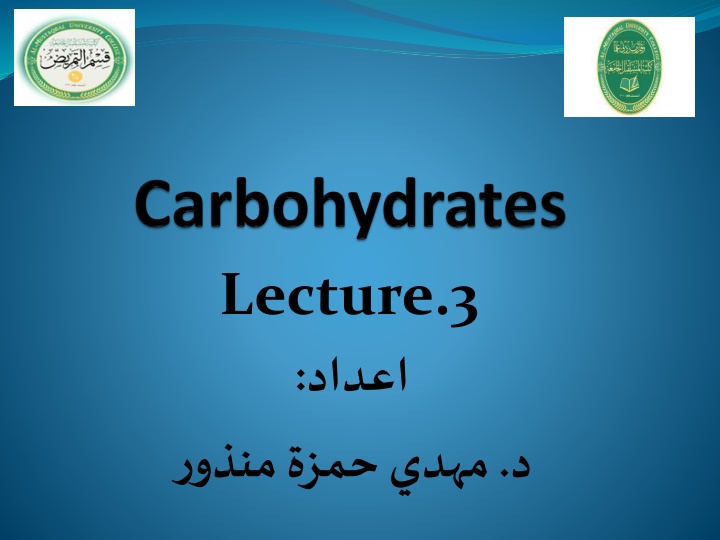
Carbohydrates
Learn about carbohydrates (CHO) and their vital role as a source of energy and support for normal body functions. Explore the sources of carbohydrates, their functions, classification based on saccharide units, and the importance of dietary fiber in promoting gut health and satiety. Discover the different types of carbohydrates, from simple sugars to complex starches and fibers, and how they contribute to overall health and well-being.
Download Presentation

Please find below an Image/Link to download the presentation.
The content on the website is provided AS IS for your information and personal use only. It may not be sold, licensed, or shared on other websites without obtaining consent from the author. If you encounter any issues during the download, it is possible that the publisher has removed the file from their server.
You are allowed to download the files provided on this website for personal or commercial use, subject to the condition that they are used lawfully. All files are the property of their respective owners.
The content on the website is provided AS IS for your information and personal use only. It may not be sold, licensed, or shared on other websites without obtaining consent from the author.
E N D
Presentation Transcript
Lecture.3 : .
Carbohydrates Carbohydrates(CHO): composed of carbon, hydrogen, and oxygen. are organic compounds They play a significant role in providing cells with energy and supporting the normal functioning of the body.
Sources of CHO: 1. Plant sources: Starches, present in cereal, roots, tubers ex: rice, wheat, potato, beets. 2. Animal sources: Glycogen
Functions of CHO: 1. Supply body for energy 1gm gives 4 cal 2. It stores in the liver and muscles for use as needed. 3. Normal fat metabolism requires an adequate supply of carbohydrates. 4. Providing fiber in the diet. Dietary fiber is found in grains, vegetables, and fruits. 5. Main source of energy for CNS is glucose. 6. Add flavor to the diet.
Classification of carbohydrates 1. Simple carbohydrates (sugars) and, 2. Complex carbohydrates (starches and fibres).
Carbohydrates are classified according to the number of saccharides (sugar units), as follow: 1- Monosaccharides (simple sugars) include: a) Glucose blood sugar (usually found in grapes, corn and blood). b) Fructose sweetest of simple sugar. Found in honey, fruits and vegetables. c) Galactose not found in free foods. Galactose is a result when the lactose breakdown. ** Simple sugar are water soluble, and quickly absorb in the bloodstream ***
2- Disaccharides (double sugars) include: a) Sucrose (glucose + fructose) ordinary table sugar. b) Lactose (glucose + galactose) milk sugar c) Maltose (glucose+ glucose) (malt sugar). 3- Polysaccharides (complex sugars) include: a) Starch ex: rice, wheat, corn, carrots and potatoes. b) Dextrins formed by the breakdown of starch. c) cellulose (fiber) Non-digestible by humans. They lower the blood glucose level of people with diabetes. d) Glycogen animal starch .
Dietary fiber is a complex mixture of plant materials that are resistant to breakdown (digestion) by the human digestive enzymes. Fiber has two forms: 1. Insoluble fibers: found in whole-grain products such as whole-wheat bread. Insoluble fiber means it does not dissolve in water. promotes normal elimination, helps to satisfy appetite by creating a full feeling, and bacteria generally do not grow and produce intestinal gas.
2. Soluble fibers: fibers found in fruits, vegetables, dry beans and peas, and some cereals such as beans and oats. Importance of Soluble fibers: play a role in reducing the level of cholesterol in the blood and It seems to bind up cholesterol allowing it to be eliminated with the stool. Disadvantages of Dietary Fibers: 1. Decrease absorption of some minerals and trace elements. 2. Intestinal bacteria ferment some fibers causing flatulence and abdominal discomfort. Requirements of dietary fiber = 20 25 gms / day OR 7 gm/ 1000 kcal
Requirements of CHO: Infants 7---10 gm / kgm of body weight 40 % -- 60 % of total energy Adult 4---6 gm / kgm of body weight 50 % ---70 % of total energy
Deficiency of carbohydrates causes: weight loss and fatigue, ketoacidosis. To prevent these effects, a minimum of 50 100 grams of carbohydrates intake each day.















